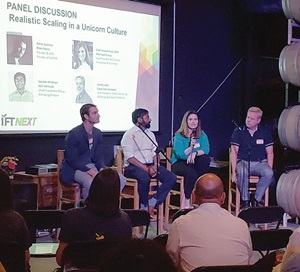Realistic Scaling in a Unicorn Culture
STARTUPS & INNOVATORS

Every startup has a dream—whether it be getting their product concept to market, becoming a successful entrepreneur, or seeing their company achieve unicorn status with $1 billion or more in market value. But the reality is this: most startups fail. At the recent IFT19 annual event in New Orleans, IFT19 Startup Alley exhibitors, finalists in the IFT19 Food Disruption ChallengeTM, and local startups had the opportunity to network and discuss the challenges they face with industry experts including venture capitalists, innovation officers, product developers, and buyers.
A panel discussion on “Realistic Scaling in a Unicorn Culture” at the IFTNEXT NOLA Startup Night provided advice on how to build and maintain a successful startup in the food and beverage space. “It [the marketplace] is getting more complex,” explained panelist Sanjeev Krishnan, chief investment officer and managing director of S2G Ventures. “There’s a lot more competition and less barriers to entry.”
While the environment enables fledgling startups to enter the market more easily, it also means an often overcrowded space in which to compete. That’s why, according to Jim Murphy, vice president of Global Venturing and Emerging Growth Platforms at Coca-Cola, it is vital to maintain competitive advantage. “If someone can copy it [the idea] the next day, you’re not going to be around for long,” said Murphy.
“Take time to build the community within the organization,” advised Chef Jessica Foust, RDN and vice president of Culinary Innovation & Nutrition for The Food Group. Formerly culinary director of Chicago-based startup Farmer’s Fridge, Foust has first-hand experience being a part of a startup that has seen stable growth since it launched in 2013. A key to Farmer’s Fridge’s success, claimed Foust, is that the entire organization is aligned around realistic goals. This sometimes means controlling creative ideas in order to remain focused on the target customer.
One advantage of today’s lower barriers to entry, said Krishnan, is that the internet enables a startup to conduct trials and get feedback before it attempts to enter the retail market. As he explained, some startups scale quickly and are not ready from an organizational or pricing standpoint for that challenge. “Not going into a certain channel is almost as important as what you do go into,” said Krishnan.
In addition to distribution, manufacturing partners are vital to the success of a startup. Foust recommended verbalizing and then writing down the standard for the product. Sometimes, this process is difficult, but the more thought out it is, the easier it will be to make sure you are selecting the right manufacturing partners to meet that standard, said Foust. “It’s not just a one-and-done,” explained Foust. “Manufacturing changes every day and you have to be on top of it and fight for that standard every single day.”
When it comes to capital investment, “every dollar counts,” according to Krishnan. “You have to prove enough to get more traction,” thereby, hopefully, securing more investment. He cautioned against financing inventory with capital investment and reminded the audience that there are “implications with whatever capital you take.”
What stake a startup founder should give up in order to get capital is “all about fit,” said Murphy. He advised making sure investors have similar values as the startup company. With corporate capital, Krishnan explained that there are a lot of benefits, such as increased distribution, but to “make sure it doesn’t harm your ability to maneuver.” In addition, taking outside investments usually puts the startup on a “time path,” said Krishnan. Investors want to know when they are going to see a return, which can put pressure on the startup to make hasty decisions that might weaken the brand. “Your only objective shouldn’t be wild revenue growth,” advised Krishnan. “Be authentic to what [the company] is and what your brand is.”
The IFTNEXT NOLA Startup Night event was supported by the Greater New Orleans Inc., New Orleans Business Alliance, Brass Roots, NOLA Brewing, and IFTNEXT.
IFTNEXT content is made possible through the generous support of Ingredion, the IFTNEXT Platinum Content Sponsor.


